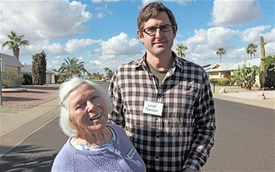Louis Theroux examines the sad world of dementia in TV documentary Extreme Love

Documentary maker, Louis Theroux, will be examining the challenging world of dementia tonight in his BBC series Extreme Love.
The second episode of his series will air on BBC Two at 9pm.
The first episode looked at a school for children with autism and this second one will look at an American care home in Arizona which looks after people with dementia.
During the show, Louis meets Gary, a 69-year-old patient who thinks he is serving in the military and that it is his job to check the state of everyone’s teeth. Louis submits to a dental check-up, is introduced to two of Gary’s new resident girlfriends and spends time with Gary’s wife of 20 years, Carla – a woman whom Gary robustly denies ever having married.
Louis also agrees to become carer-for-a-day to Nancy, a former New York model and finds a woman who can no longer remember her way through a complete sentence.
Louis called it a “heart-breaking disease” and said: “We based ourselves in Phoenix, Arizona, much of the time at a care home called Beatitudes. They had a Memory Support Unit there where we'd hang out and get to know the residents. One of them, Gary, a retired dentist, didn't realize he was at a care home: he thought he was working at an army base.”
A few times a week he would pack up his things, imagining that he’d been given another posting, and wandered the corridors looking for the way out.
The care home we were based at has a philosophy of not confronting the delusions of the residents, but instead, gently playing along with them. So rather than correcting Gary, the staff would suggest that it might be better if Gary left the following day since it was getting late.
It seemed, at first glance, a tiny bit dishonest. But I soon saw how it helped to de-escalate the episodes.
Looking after someone whose mind works in a way that is utterly different to your own demands extraordinary resourcefulness and commitment. It takes you to the limit of what love is, in a way that sometimes borders on the saintly. It also creates, at times, a very understandable sense of hopelessness and angst.”
He admitted: “It’s definitely a bit of a departure from shows I’ve done before. Unlike many of my past documentaries, there is no suggestion that there is anything untoward or even questionable in the practises at the heart of the film.”
Latest News
 29-Jul-24
Dementia Bus gives carehome.co.uk staff insight into life with dementia
29-Jul-24
Dementia Bus gives carehome.co.uk staff insight into life with dementia
 01-Mar-24
Find out the top care homes in 2024
01-Mar-24
Find out the top care homes in 2024
 21-Mar-23
UK's top care homes in 2023 revealed
21-Mar-23
UK's top care homes in 2023 revealed
 03-Jan-23
carehome.co.uk launches free care helpline
03-Jan-23
carehome.co.uk launches free care helpline
 13-Dec-22
5 mins with Emily Whitehurst, chief operating officer for Constantia Healthcare
13-Dec-22
5 mins with Emily Whitehurst, chief operating officer for Constantia Healthcare